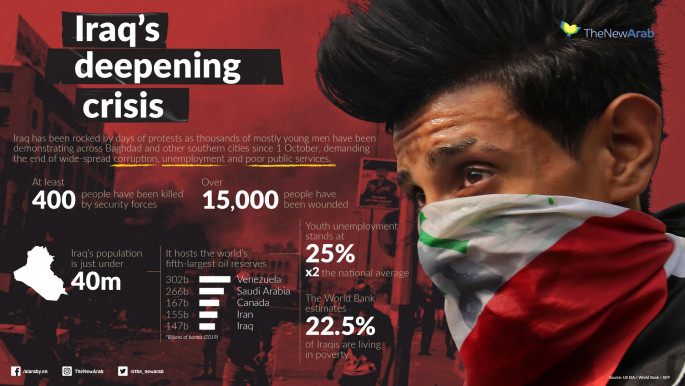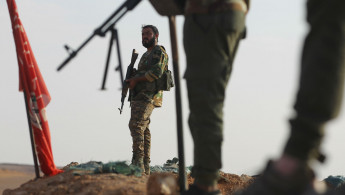The Iraq Report: US sanctions on pro-Iran militias won’t stop violence
Following massacres of protesters in the Iraqi capital Baghdad and other locations around the country, the United States government has slapped sanctions on leading Iran-backed Shia militants who have been blamed for violence against demonstrators. However, it appears unlikely that these limited measures will protect the lives of vulnerable protesters as they have almost quite literally been laughed off by the pro-Iran commanders.
However, that has not prevented the United Nations from calling on the Iraqi authorities to ensure that there is more accountability over assassinations and kidnappings designed to frighten demonstrators into submission. The constant threats against the lives of demonstrators has spread fears internationally that Iran-backed militants as well as the newly-minted Iraqi political elite who have been in power since 2003 will stop at nothing to maintain their grip on the country, no matter the butcher’s bill.
US sanctions pro-Iran Shia militants
The United States has last week slapped sanctions on three prominent Iraqi Shia militia commanders who enjoy close ties to Iran's Islamic Revolutionary Guard Corps (IRGC) after they were accused of playing a role in deadly attacks against protesters.
The three militants are widely acknowledged as being Iranian proxies and have been involved in the crackdowns since a rash of demonstrations against corruption and Iranian interference broke out across Iraq in early October.
Secretary of State Mike Pompeo announced sanctions on Qais al-Khazali, Laith al-Khazali, and Hussein Falil Aziz al-Lami - all of which are part of the Shia paramilitary force, the Hashd Al-Shaabi, or Popular Mobilisation Forces (PMF). The PMF is state-sanctioned and Iran-backed, and is recognised as an arm of the country' armed forces, leading many to suspect that it is the Iraqi version of Tehran's IRGC.
Qais Al-Khazali is also the leader of the feared Asaib Ahl ul-Haq militia that was singled out for perpetrating sectarian abuses against Sunni Arab civilians during the 2014-2017 war against Islamic State group militants.
Hussein Al-Lami, also known as Abu Zainab, heads up the PMF's feared security apparatus that has been involved in kidnappings and murders.
The force leaders were designated under the Global Magnitsky Act which means US officials will seize any assets they have in the United States and ban them from visiting the country.
The move came as President Donald Trump's administration, which considers Iran an arch-enemy, voiced alarm at rising attacks on US forces' bases in Iraq blamed on armed Shia groups backed by Tehran's clerical regime.
"The Iraqi people want their country back. They are calling for genuine reform and accountability and for trustworthy leaders who will put Iraq's national interests first," Pompeo said in a statement.
Separately, Pompeo also announced sanctions on one Iraqi Sunni politician, Khamis Al-Khanjar, on bribery allegations.

However, despite the White House's sanctions on these leading pro-Iran figures, American actions have been mocked and literally laughed off.
"They should have given us this honour a long time ago," said Qais Al-Khazali in sardonic remarks to an audience of supporters last Sunday.
"I'm embarrassed. Designate me a terrorist! A global terrorist. What is this Treasury list?" Khazali said.
"That means the money we have in US banks will go," he added sarcastically.
Analysts and experts believe that the US sanctions will do very little to quell the violence against protesters because they do not go far enough to target the Iraqi interior ministry which controls part of the country's intelligence apparatus as well as the police, both of whom have been involved in the crackdown.
Further, characters like the Khazali brothers have very little if any assets in the United States and their proximity to Iran means that they are highly unlikely to have ever planned to visit the US.
As long as they are supported by Iran and sanctioned by the Iraqi state, then it is almost a foregone conclusion that they will continue to use extreme levels of violence to crush the protest movement.
UN urges accountability over killings, kidnappings
The lack of efficacy of American sanctions was starkly highlighted by the United Nations earlier this week in a report slamming the state-sponsored violence being used against largely peaceful demonstrators.
The damning UN report released on Wednesday demanded the Iraqi government identify and hold responsible unknown groups targeting protesters with deliberate killings, abduction and arbitrary detention. It comes amid a string of targetting assassinations, and abductions and arrests of civil activists and journalists that have fostered fear among protesters.
The report from the UN Assistance Mission in Iraq (UNAMI), based on 183 interviews conducted over the last month, called on the government to identify unknown groups targeting protesters and hold them accountable.
"UNAMI continues to receive credible allegations of deliberate killings, abduction and arbitrary detention carried out by unknown armed men described as 'militia', 'unknown third parties', 'armed entities,' 'outlaws' and 'spoilers'," the report said.
"The government must identify those groups responsible without delay and hold perpetrators accountable," the report continued. "Bearing the primary responsibility for the protection of its people, the state must spare no effort to protect the peaceful protesters from violence by armed actors operating outside state control as well as those with formal and informal reporting lines within the state."
The UN also said "credible information" indicated that high profile activists and journalists were being targeted for arrest by both Iraqi security forces and "groups described as 'militia'". At least five high-profile activists have recently gone missing, the report said.
"Outside Tahrir [Square], we are not safe," Ahmed, a protester who did not provide his last name fearing reprisal, told the AP. "We know these kidnappings and killings are being done by these militia groups to scare us and make us leave."
The report came one day after the assassination of Ali Najm Al-Lami, who was kidnapped from Tahrir Square, the epicentre of the protest movement, and found dead with a gunshot wound to the head in the Al-Shaab area, northeast of Baghdad. The perpetrators have not yet been identified.
This follows a pattern of violence that has steadily increased in intensity since October. As the authorities and allied militias become emboldened by a lack of international action beyond a few short words of condemnation, their methods have increased in brutality.
Protesters will be looking to the international community to step in, or they may ultimately feel forced to defend themselves.
The Iraqi authorities are likely to escalate against the demonstrators particularly after anti-government demonstrators lynched a teenage boy they had accused of being a sniper for the pro-Iran militias.
The teenager, Maitham Ali Ismail, lived close to the protest site at Wathba Square in the Iraqi capital and was said to have fired a pistol to disperse crowds of demonstrators thronging around near his home. This led to rumours of militiamen using sniper rifles coming from Maitham's house whipping up a mob who stabbed the youth and mutilated his corpse before hanging him from his ankles.
Such gruesome violence was roundly condemned across Iraqi social media, and the country's highest Shia religious authority, Grand Ayatollah Ali Sistani, denounced the killing as a "heinous crime". Sistani also warned that such inexcusable violence could up-end months of public pressure for meaningful reform.
Ismail's murder may lead to the Iraqi government using it as a lightning rod to stamp out dissent by framing the incident as symptomatic of wider violent tendencies within the protest movement. This may then cause either the demonstrations collapsing in the face of the state's violence, or it may trigger a civil war that would be bloody and drawn out.
Either outcome would be catastrophic for Iraq which has seen close to 17 years of non-stop violence and civil strife.
The Iraq Report is a fortnightly feature at The New Arab.
Click below to see the full archive.



